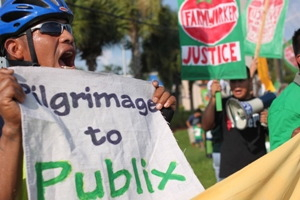Tomato Pickers Pedal for Penny

On August 27 members of the Coalition of Immokalee Workers hit the road for a 10-day, 230-mile bike ride from southwest Florida to Publix headquarters in the center of the state. They were joined by volunteers, including members of Interfaith Action of Southwest Florida.
The “Pilgrimage to Publix” asked CEO Ed Crenshaw to do the right thing and pay one more penny per pound to the tomato growers that employ farmworkers.
But, soaked in rain, the pilgrims were dismissed at the door by a public relations rep, who told them to “go ahead and wrap it up.”
“It’s been two years of letters, storefront actions, and marches, and to ride 230 miles to just be dismissed by a nameless PR agent at first was painful,” said Darinel Sales, a 26-year-old Guatemala native who’s worked in Florida fields for two years. “But that pain has turned into anger.”
Earlier in August, coalition members and supporters joined a protest tour up the East Coast that brought heat to the coalition’s other target, Trader Joe’s markets. They were met with closed doors.
“As it is now we have no protections against employer abuse,” Sales said. “With farmworkers facing long days in the blazing sun, it is critical that we receive water, shade, and reasonable workloads.”
If Publix and Trader Joe’s agreed to the workers’ demand for a penny per pound -- joining McDonald’s, Whole Foods, Subway, Burger King, and Taco Bell -- its tomato growers would receive the penny and pass it to workers in the form of a bonus in each check.
Workers are paid about 50 cents for each 32-pound bucket of tomatoes, and the extra penny increases a farmworker’s pay by 64 percent -- well worth the fight.

SUPPORT LABOR NOTES
BECOME A MONTHLY DONOR
Give $10 a month or more and get our "Fight the Boss, Build the Union" T-shirt.
About 90 percent of Florida’s tomatoes are now picked on farms that belong to the Florida Tomato Growers Exchange, which in August 2010 agreed to pass along the penny and to a Fair Food Code of Conduct. The code includes a cooperative complaint resolution system, a participatory health and safety program, and a worker-to-worker education process.
Wilson Peres, who has picked tomatoes in Immokalee for three years, said workers are starting to see the penny in their paychecks -- a “wow” moment for people who haven’t had a raise in decades.
He added that the complaint resolution mechanism allowed a woman worker to confront her supervisor over sexual harassment. When he was fired and she kept her job, she said it was first time she felt respect.
Workers are using the coalition’s low-power radio station to get the word out in the fields and invite workers to participate.
HOLD-OUTS
But Publix and Trader Joe’s have held out for nearly two years, despite workers’ many store-front actions with students and community supporters. Publix’s profits were $1.3 billion for the last fiscal year, jumping 15.2 percent from the year before. Trader Joe’s is privately held, and has been expanding aggressively.
Coalition farmworkers point out that the other food retailers are doing very well despite paying more for their tomatoes. They add that Publix pays a premium to coffee growers as part of its fair trade program, and Trader Joe’s built its identity around touting conscientious consumerism.
The companies “trade on low prices, but want Americans to think they’re about peace, love, and happiness,” said Avra Cohen, a supporter who joined the Trader Joe’s picket in Manhattan. “I love a bargain, but not when it comes out of somebody’s hide.”





